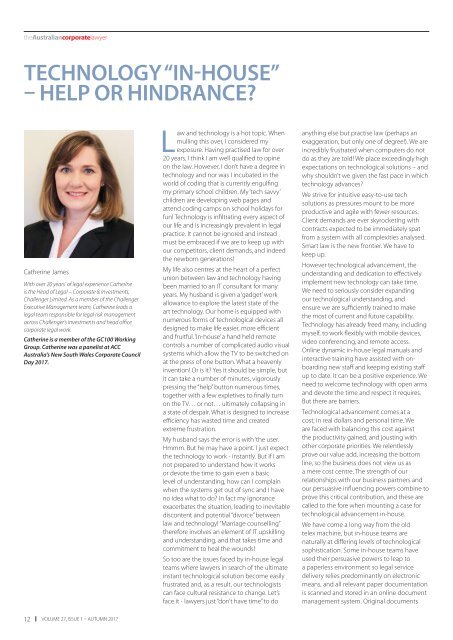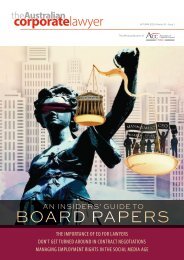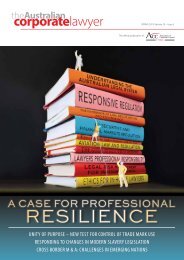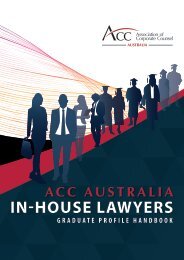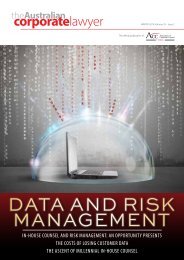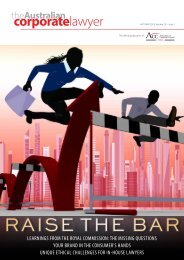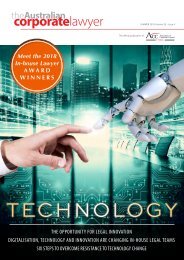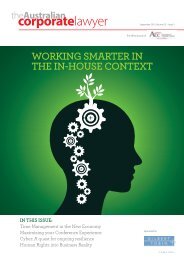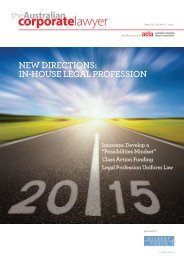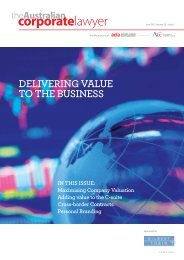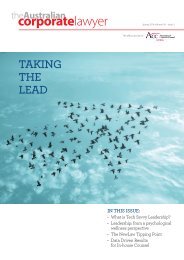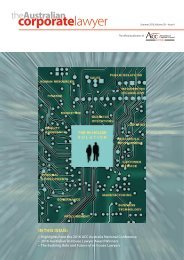Australian Corporate Lawyer - Autumn 2017
Australian Corporate Lawyer is the official publication of the Association of Corporate Counsel (ACC) Australia. The Autumn 2018 issue focuses on 'The Law and Technology' and features a range of articles covering topics including: the future of contracts and; the future of law firms as software companies..
Australian Corporate Lawyer is the official publication of the Association of Corporate Counsel (ACC) Australia. The Autumn 2018 issue focuses on 'The Law and Technology' and features a range of articles covering topics including: the future of contracts and; the future of law firms as software companies..
You also want an ePaper? Increase the reach of your titles
YUMPU automatically turns print PDFs into web optimized ePapers that Google loves.
the<strong>Australian</strong>corporatelawyer<br />
TECHNOLOGY “IN-HOUSE”<br />
– HELP OR HINDRANCE?<br />
Catherine James<br />
With over 20 years’ of legal experience Catherine<br />
is the Head of Legal – <strong>Corporate</strong> & Investments,<br />
Challenger Limited. As a member of the Challenger<br />
Executive Management team, Catherine leads a<br />
legal team responsible for legal risk management<br />
across Challenger’s investments and head office<br />
corporate legal work.<br />
Catherine is a member of the GC100 Working<br />
Group. Catherine was a panelist at ACC<br />
Australia’s New South Wales <strong>Corporate</strong> Council<br />
Day <strong>2017</strong>.<br />
Law and technology is a hot topic. When<br />
mulling this over, I considered my<br />
exposure. Having practised law for over<br />
20 years, I think I am well qualified to opine<br />
on the law. However, I don’t have a degree in<br />
technology and nor was I incubated in the<br />
world of coding that is currently engulfing<br />
my primary school children. My ‘tech savvy’<br />
children are developing web pages and<br />
attend coding camps on school holidays for<br />
fun! Technology is infiltrating every aspect of<br />
our life and is increasingly prevalent in legal<br />
practice. It cannot be ignored and instead<br />
must be embraced if we are to keep up with<br />
our competitors, client demands, and indeed<br />
the newborn generations!<br />
My life also centres at the heart of a perfect<br />
union between law and technology having<br />
been married to an IT consultant for many<br />
years. My husband is given a ‘gadget’ work<br />
allowance to explore the latest state of the<br />
art technology. Our home is equipped with<br />
numerous forms of technological devices all<br />
designed to make life easier, more efficient<br />
and fruitful. ‘In-house’ a hand held remote<br />
controls a number of complicated audio visual<br />
systems which allow the TV to be switched on<br />
at the press of one button. What a heavenly<br />
invention! Or is it? Yes it should be simple, but<br />
it can take a number of minutes, vigorously<br />
pressing the “help” button numerous times,<br />
together with a few expletives to finally turn<br />
on the TV… or not… ultimately collapsing in<br />
a state of despair. What is designed to increase<br />
efficiency has wasted time and created<br />
extreme frustration.<br />
My husband says the error is with ‘the user.<br />
Hmmm. But he may have a point. I just expect<br />
the technology to work - instantly. But if I am<br />
not prepared to understand how it works<br />
or devote the time to gain even a basic<br />
level of understanding, how can I complain<br />
when the systems get out of sync and I have<br />
no idea what to do? In fact my ignorance<br />
exacerbates the situation, leading to inevitable<br />
discontent and potential “divorce” between<br />
law and technology! “Marriage counselling”<br />
therefore involves an element of IT upskilling<br />
and understanding, and that takes time and<br />
commitment to heal the wounds!<br />
So too are the issues faced by in-house legal<br />
teams where lawyers in search of the ultimate<br />
instant technological solution become easily<br />
frustrated and, as a result, our technologists<br />
can face cultural resistance to change. Let’s<br />
face it - lawyers just “don’t have time” to do<br />
anything else but practise law (perhaps an<br />
exaggeration, but only one of degree!). We are<br />
incredibly frustrated when computers do not<br />
do as they are told! We place exceedingly high<br />
expectations on technological solutions – and<br />
why shouldn’t we given the fast pace in which<br />
technology advances?<br />
We strive for intuitive easy-to-use tech<br />
solutions as pressures mount to be more<br />
productive and agile with fewer resources.<br />
Client demands are ever skyrocketing with<br />
contracts expected to be immediately spat<br />
from a system with all complexities analysed.<br />
Smart law is the new frontier. We have to<br />
keep up.<br />
However technological advancement, the<br />
understanding and dedication to effectively<br />
implement new technology can take time.<br />
We need to seriously consider expanding<br />
our technological understanding, and<br />
ensure we are sufficiently trained to make<br />
the most of current and future capability.<br />
Technology has already freed many, including<br />
myself, to work flexibly with mobile devices,<br />
video conferencing, and remote access.<br />
Online dynamic in-house legal manuals and<br />
interactive training have assisted with onboarding<br />
new staff and keeping existing staff<br />
up to date. It can be a positive experience. We<br />
need to welcome technology with open arms<br />
and devote the time and respect it requires.<br />
But there are barriers.<br />
Technological advancement comes at a<br />
cost; in real dollars and personal time. We<br />
are faced with balancing this cost against<br />
the productivity gained, and jousting with<br />
other corporate priorities. We relentlessly<br />
prove our value add, increasing the bottom<br />
line, so the business does not view us as<br />
a mere cost centre. The strength of our<br />
relationships with our business partners and<br />
our persuasive influencing powers combine to<br />
prove this critical contribution, and these are<br />
called to the fore when mounting a case for<br />
technological advancement in-house.<br />
We have come a long way from the old<br />
telex machine, but in-house teams are<br />
naturally at differing levels of technological<br />
sophistication. Some in-house teams have<br />
used their persuasive powers to leap to<br />
a paperless environment so legal service<br />
delivery relies predominantly on electronic<br />
means, and all relevant paper documentation<br />
is scanned and stored in an online document<br />
management system. Original documents<br />
12 VOLUME 27, ISSUE 1 – AUTUMN <strong>2017</strong>


